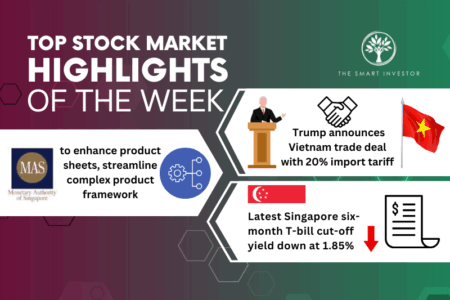If you’ve just started on your investment journey, congratulations!
The first step is always the most important, so give yourself a pat on the back for taking action to grow your wealth.
You can read our handy investment guide to find out more about how and why you should invest, as well as to understand more about growth versus income investing.
But before you can begin to buy shares, you need to first open a brokerage account.
These days, it’s fairly straightforward to get a brokerage account.
However, you might want to consider a few points before you pick a suitable broker.
Let’s go through some of these pointers.
A plethora of options
First off, let’s take a look at some of the available brokers in the market.
There are old school brokerages with a long track record such as Philip Securities, UOB Kay Hian (SGX: U10) and DBS Vickers (a unit of DBS Group (SGX: D05)).
And then there are also newer ones such as FSMOne from iFAST Corporation Limited (SGX: AIY), Tiger Brokers and Moomoo.
Moomoo is the newest kid on the block, having just arrived on our shores in March this year.
The fees you pay
Next, you will want to look at the fees that each broker is charging.
The most common fees are those related to trading (i.e. buying and selling of shares) as this is the activity most beginner investors will engage in when starting their journey.
There are also fees related to share custody if you are buying shares on an exchange that is not local (e.g. the US stock market).
But if you are just sticking to Singapore stocks, for now, you need not worry about fees as all shares are kept with the Central Depository Pte Limited (CDP), a unit of Singapore Exchange Limited (SGX: S68).
Finally, there may also be fees relating to the transfer of funds in and out of the broker’s account, as well as other fees such as inactivity fees.
Markets you can access
The next consideration should be the range of markets that the broker allows you to access.
This is an important factor if you are thinking of buying shares in overseas markets such as Malaysia, Hong Kong and the US.
Some brokers may only have access to specific stock markets. So, signing up with these brokers would mean that you are limited to investing in those countries.
Other perks and benefits
Finally, you need to consider if a broker offers additional perks or benefits when you sign up.
These perks may just tip the balance when it comes to comparing which broker to select.
A common perk is a reward system that is activated when you transact on the platform.
These usually involve a points system that can be accumulated and redeemed for rewards such as market analytics or financial magazine subscriptions.
Other brokers may dangle rewards such as free shares of blue-chip companies or have a referral system in place that offers a rebate should you successfully get a friend to sign up.
Get Smart: Check out our brokerage comparison report
If you feel that all the above sounds like a lot of homework to do, you’re not wrong.
Like any seasoned bargain hunter, you need to shop around for the best deal in town.
With the number of choices increasing by the month, it can be downright confusing.
This is why we have compiled a handy report on how you should go about selecting a broker.
You can download the report HERE.
This report lists out the available brokers and provides a comprehensive fee table.
It also shows you all the available markets that each broker covers, and lists down the perks and benefits.
We hope you find this report useful! Happy investing!
Looking for more dividend stock ideas? Then you’ll want to know about these 5 strong SGX companies. We’ve prepared everything you need to know in a FREE special report: “Dividend Stocks That Can Pay You For Life”. Click here to download now.
Follow us on Facebook and Telegram for the latest investing news and analyses!
Disclaimer: Royston Yang owns shares of DBS Group, iFAST Corporation Limited and Singapore Exchange Limited.




